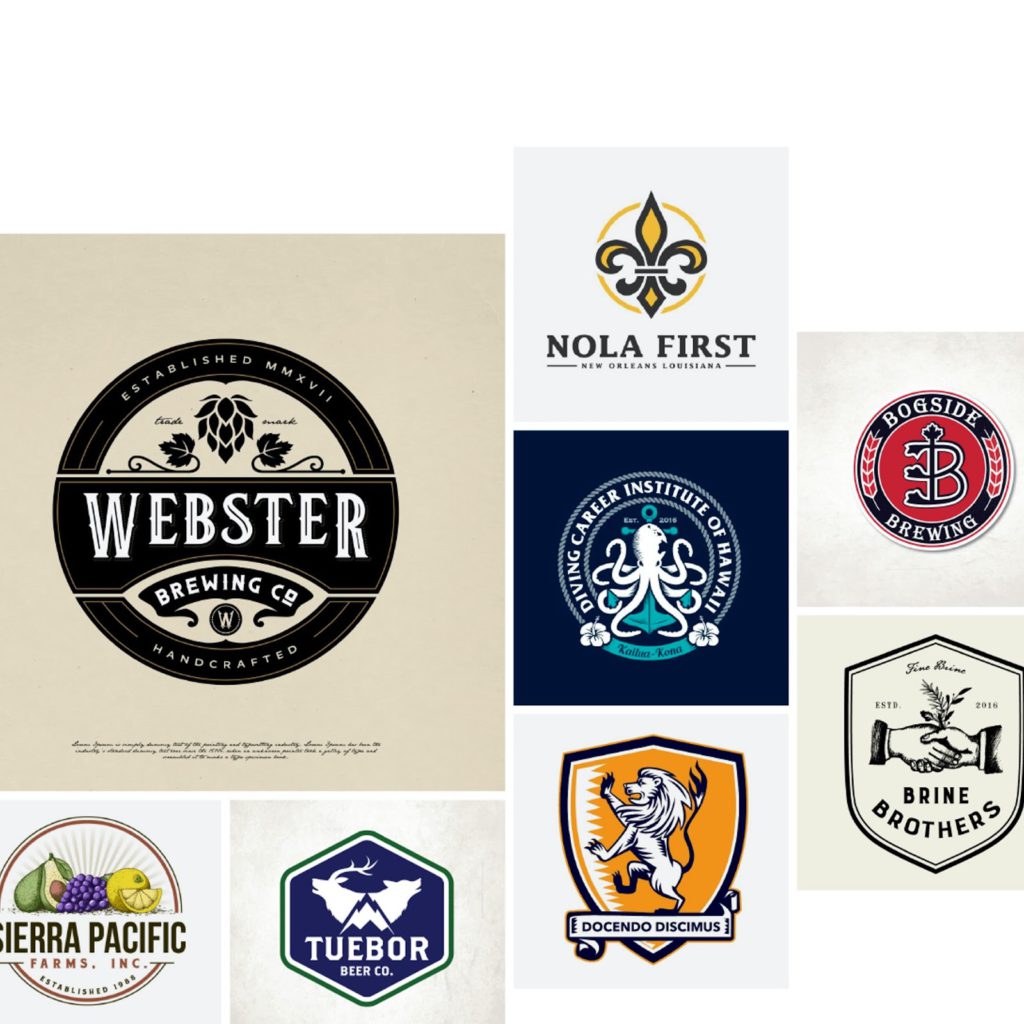
Table of Contents
- What is a Logo?
- What Distinguishes an Excellent Logo?
- Importance of Logo in Business
- Key Takeaways
- Conclusion
- FAQs
Ever wondered what’s the importance of logo? In a nutshell, it attracts attention, creates a positive first impression, and is imprinted in the minds of your customers. Your logo is vital to your company since it conveys ownership, quality, and values to your customers.
Even though it may not be the entirety of your brand recognition, your logo is unquestionably the most prominent and easily identifiable. A well-designed logo is a fantastic way to establish your brand identification, build brand loyalty, and set yourself out from the competition as a visual representation of your goal.

What Is a Logo?
The name “logo” derives from the Greek word logotype, which means “word imprint.” Using a logo, your customers can identify your business, product, or service across all platforms immediately. A well-designed logo communicates your brand’s message while creating an emotional connection with your target audience.
The importance of logo is all about creating a company’s own visual identity. Depending on the type, a logo generally consists of a character or brandmark, symbol, and slogan. Specific logos are available in various forms and sizes, ranging from basic text logotypes to abstract logo markings.
Customers are immediately connected to your brand when they see your logo across various channels, including digital and print materials.
Business cards often have logos printed on one or both sides, making them one of the most common places to see logos. Flyers and brochures with prominently displayed business emblems are among the most effective ways to connect what’s written there to your brand.
Your logo serves as a primary means of identifying your company on your website. The use of a corporate logo on official communications aids in identifying messages sent officially by your firm. A press release, a presentation, or an investor deck may also use this logo.
Facebook, Twitter, Instagram, Pinterest, and other social media networks use your logo to represent your company.
Different types of logos
There are seven types of logos to choose from and each conveys a distinct personality to your company. Because prospective clients will notice your logo, you need to ensure it’s perfect.
To figure out which logotype is most suited for your company, you may consider the following tips for creating a logo.
1. Wordmarks Or Logotypes

When used in conjunction with the company name, wordmark or logotype is similar to letter mark; both are font-based. Think Visa and Coke; companies with memorable and straightforward characters benefit significantly from wordmark logos. An excellent example of this is Google’s logo, which is simple and effective.
Using a letter mark logo is a good idea if your company’s name is very lengthy. New businesses or those starting may benefit from this strategy.
2. Pictorial Marks Or Logo Symbols

Pictorial marks are icons or graphics-based logos used to identify products or services. The famous Apple logo and the Twitter bird are probably the first images that spring to mind. These firms’ logos are so distinctive and well-known that the mark is immediately identifiable.
A visual mark’s most important consideration is which picture to choose. You can count on this to be a part of your business forever.
3. Monogram Logos Or Lettermarks

Monogram logos are made from letters, generally the company’s initials or person. IBM, CNN, and HP are just a handful of well-known companies with long names that use their initials as abbreviations. Having just two or three words to remember, they’ve each resorted to employing their initials as a brand-identification method.
If your firm has a lengthy name, a letter mark logo is an excellent choice for simplifying your organization’s visual identity.
4. Abstract Logo Marks

Abstract logo marks symbolize your company instead of identifiable images like an apple or a bird. Abstract markings, like other logo symbols, perform because they distill your brand’s identity into a single visual representation. As a result, these logos enable you to convey your brand’s identity.
With an abstract logo, you may transmit your company’s symbolism without depending on the cultural connotations of a particular picture.
5. Mascots

A mascot logo is a logo that illustrates a particular character. A mascot is a cartoon figure that symbolizes your business. Mascots are fantastic for firms who wish to appeal to families and children by creating a healthy environment for their products or services. Sporting event mascots generate an excellent atmosphere by engaging with the crowd and interacting with the players.
6. The Emblem

Think about badges, seals, and crests while creating an emblem logo. It’s common for schools, companies, and government agencies to use these logos since they have a traditional look that may make a strong impression. Emblem logos are trendy in the automotive business. Some firms have modified the conventional insignia appearance while maintaining its original aesthetic.
7. The Combination Mark

This logo mixes a wordmark and a pictorial mark, abstract mark or mascot, or a combination of all these elements. The image and text may be designed together to produce a logo in any way you see fit. Burger King and Lacoste are two examples of well-known combination mark logos.
Using a combination mark is a good option since the name and picture work together to strengthen your brand identity.
What Distinguishes an Excellent Logo?
If you want a nice logo, you need one tailored to the specifics of your company or service. For instance, if a business provides professional services rather than a product, it’s often ideal for keeping things simple. Wordmarks or typographic logos in this case make the most sense. Developing a distinctive logo is essential to setting your company apart from the competition and encouraging customers to stick with your brand.
At the same time, what matters most to your consumers is their perception of your product or service and the values it represents, not the logo you have chosen to represent your company. It’s more than simply a lovely face; good design conveys a more profound message as well.
Importance of Logo In Business
The perfect logo expresses everything without saying a word. It’s your logo that introduces your business to the audience. The initial impression of a strong logo animation piques consumers’ curiosity and encourages them to learn more about the company. Customers are likely to form an opinion about your company by just looking at the logo.
The importance of logo in business is well understood; it transmits a succession of qualities and principles. A logo connotes honesty, trust, pride, excellence, and integrity. It creates a relationship between a business and customers who support, criticize and advocate it.
Let’s take a closer look at why a company’s logo is so significant.
1. A logo makes an excellent first impression
First impressions count, and your logo is the first thing customers see when they visit your business. Creating a solid first impression is critical for your company; therefore, you must ensure that your brand personality is intriguing and better than the competition.
When it comes to business, you should never compromise on the quality of your impression. The logo is an excellent place to start if you want to get your target audience’s attention. Customers are more likely to interact with a company whose well-designed bespoke logo represents products or services.
2. The logo is the building block of your brand identity
Successful branding is all about conveying a compelling narrative that elicits an emotional response from consumers. Your firm will become more sought after and beloved if you have a strong brand identity.
Even if logo design is just a tiny component of the whole brand narrative, it acts as the basis for the complete story. Choosing colors, tones, and typefaces is based on your brand’s history, and your logo sets the scene.
Once your logo has been created, the features will apply to your marketing materials, including letterheads and business cards, and also become a part of your brand guidelines. This creates an identifiable and marketable brand image.
3. A logo reinforces professionalism
Credibility as a company is essential for attracting long-term clients. A set of regulations establishes a company’s stability and professionalism. These characteristics allow a business to acquire the confidence of its prospective clients and boost the likelihood of a sale.
The highest standards of a company’s professionalism are unquestionably its ability to provide high-quality products and services while delighting its clients. Even though a logo is just a minor element of your business’s daily operations, it is nevertheless vital.
4. Your logo conveys the essence of your brand
A logo is more than just a visual representation of a company’s identity; it must also convey a meaningful message. Make the consumer ponder your logo for a few seconds before they go to the next brand. The design has to have some significance for them.
It’s important to remember this while designing a bespoke logo for any company. A logo is one of the most effective techniques to get your company’s name out there and convey your message.
5. A logo can be a marketing tool
People are pretty engaged on social media platforms like Facebook, Instagram, Twitter, etc. If you’re specifically targeting these, then unique logo design is critical to your company’s marketing.
The logo will appear next to the brand name wherever it displays. Creative logo design is a great way to grab the attention of clients. So, utilize your logo as a marketing tool to maximize your online platform exposure.
The Role of Logo Design
Following our logo design tips and then crafting a well-designed one can help establish your credibility and encourage your customers to remain around. This way, clients get a sense of who you are and what you do.
A logo tells customers who have no previous information or experience with you that you’re a fantastic company to do business with.
Your customers will lose faith in your ability to provide quality goods and services if your logo seems unprofessional. People make rapid decisions, and bad design will drive them away. A powerful logo will help your business stand out to customers, help them remember it, and help them form favorable connections with it.
Make a significant financial commitment to creating a distinctive logo to make your potential customers trust and buy from you.
Key Takeaways
- The logo design’s importance should never be compromised while establishing a business.
- The logo is a critical element in building a company’s brand.
- It has the potential to be an effective weapon for luring clients to your business.
- A custom logo is important for every company as it has the potential to increase profits.
- The logo may serve various purposes, and a well-designed one can significantly influence.
Conclusion
A logo is an essential aspect of creating a successful company and brand. The importance of a logo cannot be ignored as it is crucial in making a compelling first impression on prospective clients. There’s no better moment than now to embrace the power your logo can have, whether you’re just starting or upgrading your identity.
FAQs
A good logo should be unique, suitable, visual, and essential in form, and it should reflect the idea it is trying to convey.
A good logo should be acceptable in tone, unique and memorable, and easy to show on various platforms in different sizes.
The considerations include making sure it symbolizes your business, following classic logo design tips, choosing the right colors and typeface alternatives, and making it great.
Even if you run a small business, a logo is essential to your company’s identity and branding.
A logo’s use of distinctive colors, typefaces, and pictures quickly establishes a company’s identity and helps consumers to recognize its core values.
Latest Blogs
Explore how Google’s 2025 AI search updates triggered ranking chaos. Learn actionable strategies to adapt your SEO for AI Overviews, zero-click searches, and SERP volatility. Stay ahead now.
Learn how to rank on AI search engines like ChatGPT, Perplexity, and Gemini by optimizing your content for authority, structure, and relevance. Stay ahead in AI-driven search with this strategic guide.
Explore the best healthcare SEO services for your medical practice. Improve online visibility and effectively reach more patients in need of your services.
Get your hands on the latest news!
Similar Posts

Design
7 mins read
15 Best Firms Offering Design Services in India

Design
5 mins read
All You Need to Know About Data-Driven Design

Design
6 mins read